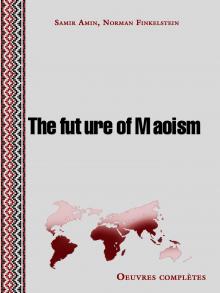Livrel(ePUB, HTML, Tatouage) 100p.
(Alter développement)
ISBN: 978-2-37918-335-5
This book is being republished after a decade, where Samir Amin analyses the role and future of Maoism in China and the implications of its success or failure for the entire Third World. In the frist part, Amin outlines three models of accumulation-socialist, capitalist, and statist - and projects the long-term implications of each for an underdeveloped country. The second part is then devoted to an examination of China's economic performance during successive phases of development under Mao. A third and final part compares the Maoist to the revisionist approach to development, particularly regarding revolutionary class alliances, linking the future of Maoism to the nature of worldwide revolution. In a postscript written for this volume, Amin, discussing the « Chinese model », proposes a method of analysis which, while emphasising the social, political and ideological struggle in China, places the debate in the context of the discussion about the challenges posed by the « long transition from world capitalism to world socialism. » This volume also contains a stimulating foreword by Vaskar Nandy, a leading communist revolutionary of India and a rejoinder to him by Samir Amin on what should constitute the Marxism of the 21st century and the prospects of « delinking » for the periphery.








